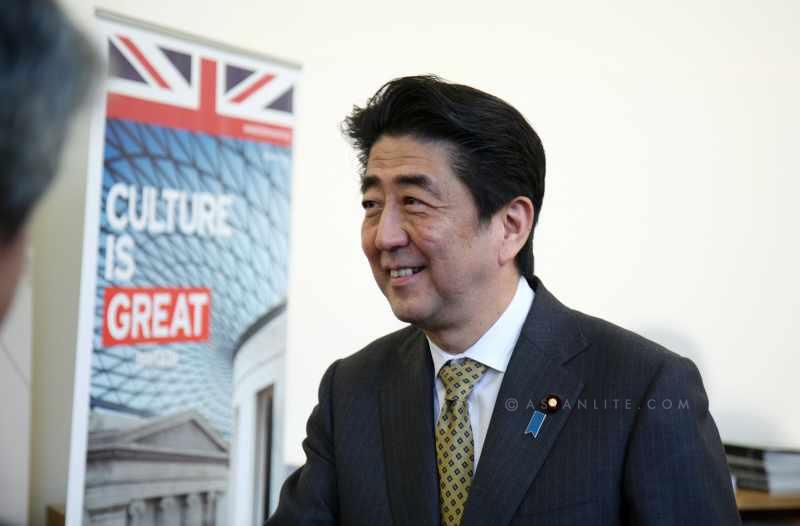Bilateral strategic and economic relations between India and Japan are at their best and the governments of both countries are keen to further strengthen them, an advisor to Japanese Prime Minister Shinzo Abe said.

Addressing an event here through a video call from Tokyo, Tomohiko Taniguchi, special advisor to the cabinet of the Japanese prime minister, said the new Indian government led by Prime Minister Narendra Modi has shown keen interest in further strengthening bilateral ties.
“Modi and Abe are big leaders internationally. But together they can grow higher,” Taniguchi said at the event organised by Ananta Aspen Centre here.
The interactive session on “India’s Japan Moment: Leaders Must Capitalise” was organised ahead of Narendra Modi’s planned visit to Tokyo.
“Japan and India can strengthen their relationship in the realms of foreign policy, economy and regional security in the Indo-Pacific,” Taniguchi said.
He said the two countries should collaborate on development cooperation in African nations.
“Strengthening the defence architecture and nuclear energy are other areas of convergence,” he added.
Economic diplomacy
External Affairs Minister Sushma Swaraj Monday chaired a meeting of India’s envoys in neighbouring countries to discuss economic diplomacy and other issues in a sign of the new BJP-led government’ intention to keeping up momentum of outreach to SAARC leaders.
External affairs Ministry spokesperson Syed Akbaruddin said the meeting discussed ways in which envoys could assist in strengthening the process of country’s development.
“The meeting is geared towards maintaining the momentum that was set in motion of giving priority to our neighbours by the prime minister (Narendra Modi) when he invited them to his swearing-in ceremony. The prime minister has made it clear the overriding priority for India is to scale and speed our comprehensive national development,” he said.
Asked about the presence of Indian envoys from central Asian countries and if it was related to issues concerning energy security, Akbaruddin said economic diplomacy was an important aspect of the country’s foreign policy
“When we invite ambassadors, they discuss a variety to issues including development partnership and economic diplomacy which is an important aspect of our foreign policy,” he said.
Sources said that the first-of-its-kind meeting was attended by Indian envoys in SAARC countries and some other countries in the neighbourhood and central Asia.
They said that meeting also discussed the possible implications of withdrawal of US forces from Afghanistan.
The Modi government has given a thrust to boost India’s relations in the neigbhourhood. While top leaders from SAARC countries came to attend his swearing in, Modi chose Bhutan as his first overseas destination.
The sources said that during the meeting, Sushma Swaraj took stock of the present state of India’s relations with the neighbouring countries and outlined priorities of the new government. External Affairs Minister Sushma Swaraj Monday chaired a meeting of India’s envoys in neighbouring countries to discuss economic diplomacy and other issues in a sign of the new BJP-led government’ intention to keeping up momentum of outreach to SAARC leaders.
External affairs Ministry spokesperson Syed Akbaruddin said the meeting discussed ways in which envoys could assist in strengthening the process of country’s development.
“The meeting is geared towards maintaining the momentum that was set in motion of giving priority to our neighbours by the prime minister (Narendra Modi) when he invited them to his swearing-in ceremony. The prime minister has made it clear the overriding priority for India is to scale and speed our comprehensive national development,” he said.
Asked about the presence of Indian envoys from central Asian countries and if it was related to issues concerning energy security, Akbaruddin said economic diplomacy was an important aspect of the country’s foreign policy
“When we invite ambassadors, they discuss a variety to issues including development partnership and economic diplomacy which is an important aspect of our foreign policy,” he said.
Sources said that the first-of-its-kind meeting was attended by Indian envoys in SAARC countries and some other countries in the neighbourhood and central Asia.
They said that meeting also discussed the possible implications of withdrawal of US forces from Afghanistan.
The Modi government has given a thrust to boost India’s relations in the neigbhourhood. While top leaders from SAARC countries came to attend his swearing in, Modi chose Bhutan as his first overseas destination.
The sources said that during the meeting, Sushma Swaraj took stock of the present state of India’s relations with the neighbouring countries and outlined priorities of the new government.